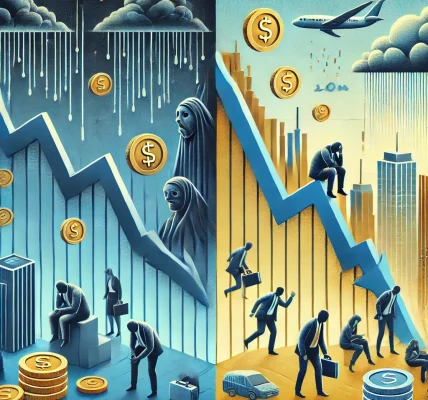Introduction
The global housing market has seen rapid growth over the past few decades, with record-high property prices in many countries. However, concerns about rising interest rates, inflation, and economic uncertainty have led many analysts to question whether a housing market crash is imminent. This blog explores current housing market trends, key risk factors, and whether a major downturn is on the horizon.
The Current State of the Global Housing Market
Rising Home Prices
In many major cities across the world, housing prices have increased significantly. This trend has been driven by factors such as:
- Low interest rates, making borrowing cheaper.
- High demand for homes, fueled by urbanization and population growth.
- Supply shortages due to labor and material costs.
- Increased investment in real estate as a hedge against inflation.
Post-Pandemic Recovery and Challenges
The COVID-19 pandemic initially led to uncertainty in the housing market, but many economies saw a housing boom due to government stimulus packages and low mortgage rates. However, as economies recover, central banks are raising interest rates to combat inflation, making home loans more expensive.
Regional Market Variations
The impact on housing markets varies by region:
- United States: Rising mortgage rates have slowed home sales, but prices remain high due to supply constraints.
- Europe: Countries like the UK and Germany have seen property prices cool as borrowing costs rise.
- Asia: China’s real estate sector, led by companies like Evergrande, has experienced significant debt issues, raising concerns of a broader crisis.
- Australia & Canada: These markets have seen high property price growth but are now at risk due to increased mortgage rates and high household debt levels.
Factors That Could Lead to a Housing Market Crash
1. Rising Interest Rates
One of the biggest threats to the housing market is the rise in interest rates. Central banks worldwide, including the Federal Reserve, European Central Bank, and Bank of England, have been increasing interest rates to curb inflation. Higher rates mean:
- Increased mortgage costs for new buyers and those refinancing.
- Lower home affordability, reducing demand.
- Higher risk of mortgage defaults for homeowners who can no longer afford payments.
2. Housing Affordability Crisis
As home prices outpace wage growth, affordability becomes a major issue. Many first-time buyers are priced out of the market, leading to:
- Reduced demand for homes.
- Slower price growth or price declines in overvalued areas.
- Increased rental demand, further driving up rental prices.
3. Economic Recession Risks
If a global recession occurs, job losses and lower consumer confidence could lead to a housing market downturn. Past recessions, such as the 2008 financial crisis, saw dramatic declines in home values due to:
- Foreclosures and distressed sales flooding the market.
- Declining investor confidence in real estate.
- Credit tightening, making it harder for buyers to secure loans.
4. Real Estate Bubbles in Certain Markets
Some cities have experienced extreme property price growth, creating potential housing bubbles. These bubbles can burst if:
- Investors pull back due to changing economic conditions.
- Governments introduce new regulations to cool the market.
- Speculative buying slows, reducing demand.
5. China’s Property Market Instability
China’s real estate sector is one of the largest in the world, and its slowdown has global implications. Developers like Evergrande have struggled with debt repayment, causing concerns about:
- A potential ripple effect on global financial markets.
- Reduced demand for construction materials, affecting commodity prices.
- Spillover effects into other economies reliant on Chinese investment.
Could a Market Correction Happen Instead of a Crash?
While some indicators suggest a housing market crash is possible, many experts believe a correction—where prices gradually decline rather than collapse—is more likely. Factors supporting this view include:
- Strong labor markets: Employment levels remain high in many countries, providing financial stability for homeowners.
- Government interventions: Policymakers may introduce measures such as mortgage relief or tax incentives to prevent a crash.
- Continued housing demand: Even with rising rates, housing demand remains strong in urban areas and growing economies.
What Homebuyers and Investors Should Do
For Homebuyers:
- Evaluate affordability: Consider how rising interest rates will affect mortgage payments before purchasing.
- Avoid overleveraging: Ensure you have a stable income and emergency funds in case market conditions change.
- Look for undervalued markets: Some regions may offer better long-term investment opportunities than overpriced urban centers.
For Investors:
- Diversify real estate investments: Consider rental properties, commercial real estate, or international markets to reduce risk.
- Monitor economic trends: Stay informed about interest rate changes, inflation, and housing policies.
- Be cautious with high-risk properties: Avoid speculative investments in overheated markets.
Conclusion
The global housing market is at a critical juncture, with rising interest rates, economic uncertainty, and affordability issues influencing trends. While a full-scale crash is uncertain, market corrections are likely in various regions. Buyers and investors should remain cautious, stay informed, and make financially sound decisions to navigate potential risks. As the market continues to evolve, adaptability and strategic planning will be key to weathering any downturns.




